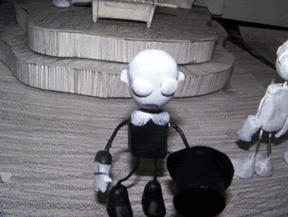While reading about this work is interesting, I'd much prefer to see it for myself. Until then I have a hard time figuring out what might offend others so much about her work by the description alone. It's just stating a message of awareness, not one of hatred, at least from what I could gather from reading all this. Then again, I've never been the sort to get easily offended. If I had a gallery of my own, I'd make a habit out of going out of my way to show work that brings up controversy. Why? Because I think the most powerful statements are those that get people to be passionate, even in a negative sense.
1. I guess I'd identify with the sheltered white girl stereotype. You know. Sandra D from Grease. Yeah, that's me. Only I didn't conform in order to be cool for my boyfriend and his greaser buddies.
2. I feel most masculine when I'm playing a video game that involves lots of killing. I get enraged, start yelling and cursing, having 'you're gonna die' macho moments and a random craving for beer. First person shooters are the most fun to play when I'm a little tipsy. I stop getting stressed and empty bullets into things without a hint of remorse.
3. Er...taking care of my sister? It used to be my brother, but now I act like I'm more of his pal than I used to because he's older. My sister is 2, I think. 3? Oh crap, I can't remember. But in any case, she's still a baby/toddler. So when I take care of her, I'm like mother goose or something. I'm always making sure she doesn't fall over and crack her skull and such.
4. Sure? I don't know how you'd get the feminine one. Maybe bring a little kid to me and I'll play with him/her. I used to hate kids, but I just found out I'm not fond of taking care of babies. Kids are fun. And bring me a tequila and Fallout 3--I'll show you the other side of the coin.
5. I think that's both stupid and screwed up. The problem is if she makes a fuss about it, she's likelier to have her name on that list permanently. It's not very fair for her though. I can't understand why they'd do that when she hasn't done anything remotely to deserve it.
6. I don't know. It depends on how bad things are where I'm at. Unless the world around me is on fire, or someone needs me in the US, I might make the same decision.
7. I think her work is intriguing, and like I said before, I'd love to see it in person. If the message is powerful enough to get it banned out of a few galleries, I need to behold such a thing.
In my art, I don't tend to explore any controversial material. I'm dealing with the end of the world, but not in its eschatological forms which deal with religious perspectives on the end. I didn't want to get into that because I had a hard time believing in the possibility of the world being ended by some supernatural force. I either thought it would come upon us because of the fault of man or cosmic forces. They seemed a lot more likely, and these are themes often repeated in film, which may not be reality itself, but resembles it enough to make an impact. If not, audiences wouldn't be able to sit through it. So because of the fact that I'm ignoring one of the most controversial subjects of all time--religion--I've managed to avoid something that could raise a ton of questions I don't care to answer. But the problem then is, what is the message? If the power of controversy is gone, what strength is my work left with? Effects aside, what message does the material convey?

No comments:
Post a Comment